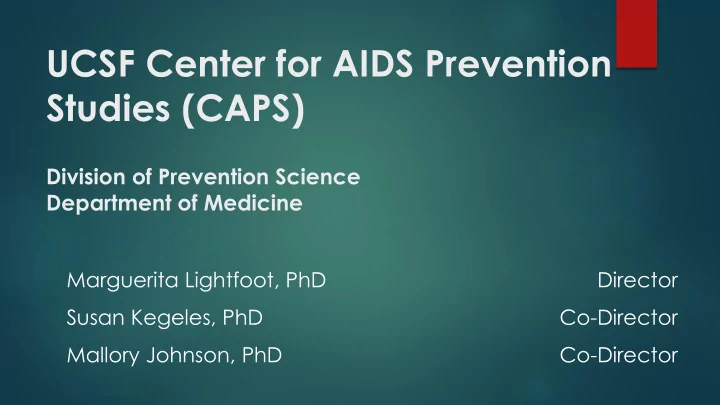

UCSF Center for AIDS Prevention Studies (CAPS) Division of Prevention Science Department of Medicine Marguerita Lightfoot, PhD Director Susan Kegeles, PhD Co-Director Mallory Johnson, PhD Co-Director
UCSF School of Nursing School of Pharmacy School of Medicine School of Dentistry Department of Medicine 27 other Departments Division of Prevention 15 other Divisions Including Division of HIV/AIDS Science Chief: Lightfoot Center for AIDS Prevention UCSF Prevention Research Center Studies (CAPS) Director: Lightfoot Director: Lightfoot
Division of Prevention Science Faculty Professor (10) Assistant Professor (8) Marguerita Lightfoot, PhD Parya Saberi, Pharm.D. Susan M. Kegeles, PhD Mi-Suk Kang Dufour, PhD, MPH William J. Woods, PhD Amy Conroy, PhD Edwin Charlebois, PhD, MPH Mallory O. Johnson, PhD John Sauceda, PhD Maria Ekstrand, PhD Judy Tan, PhD Torsten Neilands, PhD Will Vincent, PhD Judy Auerbach, PhD Will Brown, PhD, PhD Janet Myers, PhD, MPH Kim Koester, PhD Stephen F. Morin, PhD, Emeritus Affiliated CAPS Faculty Associate Professor (7) Sheri Weiser, MD Jae Sevelius, PhD Carol Camlin, PhD, MPH Emily Arnold, PhD, MPH Willi McFarland, MD, PhD Wayne Steward, PhD, MPH George Rutherford, MD Starley Shade, PhD Hong-Ha Truong, PhD, MS, MPH Ariane Van Der Straten Greg Rebchook, PhD Carol Dawson Rose Sheri Lippman, PhD, MPH (and others)
CAPS, established in 1986 Developmen tal Core Community Administrati Engageme ve Core nt Core Innovative Research CAPS Cores All provide Intervention Services, including & Methods Implementa consultations Core -tion Science Core
Developmental Core Director: Mallory Johnson TO SUPPORT TRAINEES & SCIENTISTS TO CONDUCT HIGH-IMPACT, INNOVATIVE, TIMELY HIV PREVENTION RESEARCH 3 TRAINING PROGRAMS: TAPS, VPS, ITAPS
Developmental Core provides: Pilot funds to support cutting-edge, interdisciplinary research in high-priority areas (Innovative Projects) – part of RAP – tends to be social/behavioral (like CAPS) – $40,000 – call is usually only in Winter Peer review system (for proposals, manuscripts; concept reviews, grant proposals, summary sheets) – chair & 3 peer reviewers, done in collegial manner Town Halls on various HIV-related topics (Tuesdays 11 – 12 pm)
TAPS (Traineeship in AIDS Prevention Studies – T32 postdoctoral training program, 8 fellows (50% are from URM groups) including: Akua Gyamerah, PhD Anna Leddy, PhD Pam Murnane, PhD Chemtai Mungo, MD Paul Wesson, PhD Sarah Puryear, MD Glenda Baguso, PhD Edda Santiago Rodriguez, DrPH Visiting Professors’ Program - Training Program for Early-Career Scientists doing Research to Reduce HIV Health Disparities, most are from URM 12 faculty members from around US (UCSF, Emory, U of Mich, Temple, Mississippi State, Hopkins), in Nursing, Counseling, Epidemiology, Social Work & other) I-TAPS (International TAPS) Mentoring the Mentors Program (joint CAPS & CFAR)
Methods Core Director: Tor Neilands OPTIMIZE DEVELOPMENT AND IMPLEMENTATION OF - EFFICACIOUS INTERVENTIONS FACILITATE THE USE OF EMERGING TECHNOLOGIES - IMPLEMENT BEST PRACTICES IN: - designing studies and measurement instruments - data acquisition - Data management - analysis -
Qual and Quant Expertise quarterly workshops & seminars on emerging research designs and methods, e.g., recruitment of vulnerable populations pre and post-award consultations on refining research questions, study design, sample size, methods of analysis, qualitative & quantitative methods, optimal measures, qual & quant methods, interview questions Participate in peer reviews of grant proposals
Community Engagement Core Director: Greg Rebchook BRING HIGH-IMPACT HIV PREVENTION SCIENCE TO COMMUNITIES BRING COMMUNITIES’ PERSPECTIVES TO HIGH -IMPACT HIV PREVENTION SCIENCE
Facilitate communities’ access to and use of CAPS research Synthesize and disseminate cross-cutting research findings Fact Sheets Host National Transgender Health Summit in Oakland; last time had 880 attendees from 42 states and seven foreign countries. Provide TA to communities Help CAPS researchers develop effective, innovative, and broad-reaching dissemination strategies for their research
Supports scientists’ use of community expertise Maintains 12-member CAPS Community Advisory Board (CFAR is encouraged to use!) Hosts Town Halls in which CBOs taught faculty about their work Facilitates connections and partnerships between CAPS scientists and communities Matched many scientists with community-based orgs and people
Intervention & Implementation Science Core Director: Susan Kegeles -TO FOSTER CUTTING-EDGE RESEARCH THAT WILL CREATE THE NEXT GENERATION OF PREVENTION INTERVENTIONS -TO ENSURE THE SUCCESSFUL IMPLEMENTATION OF PREVENTION PROGRAMS AND TECHNOLOGIES WHERE THEY ARE NEEDED MOST
I & I Core: Spectrum of HIV Intervention and implementation Science
Galvanize interdisciplinary advances across the spectrum of HIV intervention & implementation science Leverage the latest findings in basic and HIV-related biomedical, social-behavioral, mental health, public health, and technology-related disciplines to inform innovations in HIV intervention design, testing, and scale-up Town Halls on Newest Issues – e.g., up next is Behavioral Economics Town Halls on other issues, eg, current status of adherence research internationally; retaining participants in mobile phone research Foster collaboration among multidisciplinary scientists to conduct innovative intervention research and guide the translation of effective interventions into practice Interactive Town Halls, e.g., cure research – few weeks ago Quarterly meetings on Implementation Science
Hone scientists’ skills to work along the spectrum of HIV intervention and implementation science Increase knowledge about intervention development and implementation approaches that are culturally competent and can be used to address myriad prevention targets Developing fluency to study and work within diverse organizational, political, and social structures to foster the translation of effective interventions into practice Town Hall on working with policy makers/policy environment to translate research into practice
Assure that CAPS research meets the highest ethical standards Consultations on ethical and human subjects issues arising in research projects Former chair of IRB meets with investigators about IRB-related issues (86 consultations) on large variety of topics, e.g., different ways to compensate participants (via Venmo?), obtaining consent from minors, common rule Provide assistance in formation and working with a data and safety monitoring board (DSMB)
Recommend
More recommend